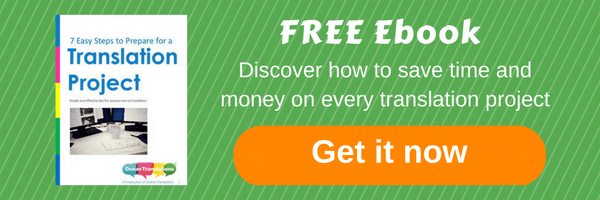One of the main challenges for a company is to find suitable translators for their linguistic needs.
Today you may be asking yourself: Should I go with a freelance translator or hire a translation agency for my translation project?
There isn’t a straight answer to this question as in some occasions, it makes sense to work directly with a freelance translator and in some others, a translation agency is a better fit for your needs.
Watch this video to find out 7 reasons to hire a translation agency.
An agency will be able to offer a full range of linguistic services.
What does this mean to you?
#1
An agency can handle all types of projects, such as:
– Document translations
– Website and social media translations
– Audio and video transcription
– Subtitling
– Even remote interpreting
#2
With an agency you don’t have to worry about any technical issues.
You can just do your work!
Agencies have their own designers who will extract all necessary text and then insert its translation, this is known as Desktop Publishing or DTP.
They will maintain the look and feel of your original concept, taking into account any word increase.
Thus, saving you time and money, that’s #3.
#4
An agency will be able to offer different languages and variants.
For instance, an agency may offer Spanish for US, Mexican Spanish, Argentinean Spanish as well as Brazilian Portuguese. Whereas a translator may only be able to offer one or 2 variations of Spanish.
What about a very large project with tight deadlines?
A larger team means more translators, editors and reviewers available to work on your urgent project.
#5
An agency has a large pool of resources and linguists teamed up to meet your criteria.
They have translators, editors, proofreaders and subject-matter experts on their books already vetted by their vendor manager and available to take care of your translation projects.
Which means that they can match the right linguists for the right project.
In my opinion, this is one of the greatest advantages of a translation agency, you can have a medical translator working alongside a medical doctor.
#6
Agencies are more likely to have a multi-step Quality Assurance process because in this industry “No News Isn’t Good News”. We don’t wait for someone to complain to take actions. The translation process is constantly evaluated. Each step is recorded and assessed, and corrective actions can be implemented as soon as an issue is identified.
A multi-step QA process begins with experienced, subject-oriented reviewers. They oversee the translations carried out by professional linguists who are also carefully chosen on a per-project basis.
If you hire a translation agency, every single project will be translated by an expert translator, then revised by a second linguist and even sometimes proofread by a third one. If your project includes a
If your project includes a formatting phase, your files will be revised a first time straight after the translation (the linguist will be looking at the raw text without any format) then after the formatting stage by the graphic designers, the editor will do a final check to make sure that there are not truncated words, missing words or punctuation errors.
#7
The agency project manager is your unique point of contact for all your linguistic needs. (all languages and services)
It doesn’t matter if you have 10 files to translate in 2 or 3 different languages and that you also need to update your marketing material in each of these languages and subtitle the accompanying videos. When you hire a translation agency, the project manager will be your only point of contact for all your requests.
New to Translations? Download our free ebook to find out how to save time and money from your very first translation project.
About the Author:
 Sabine Panneau is the Business Development Manager for Ocean Translations, Argentina’s premier language service provider, which mission is to help international clients and multilateral organizations conduct business in the US, in Latin America and the rest of the world by providing language solutions in Spanish, English and Portuguese, including medical, technical and software translations among others.
Sabine Panneau is the Business Development Manager for Ocean Translations, Argentina’s premier language service provider, which mission is to help international clients and multilateral organizations conduct business in the US, in Latin America and the rest of the world by providing language solutions in Spanish, English and Portuguese, including medical, technical and software translations among others.

